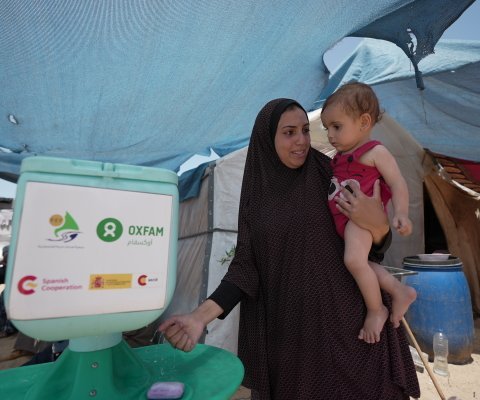Oxfam America welcomes President Obama’s new strategy for sub-Saharan Africa released on Thursday and looks forward to working with the Administration to implement its vision. The strategy focuses on four main pillars of strengthening democratic institutions, spurring economic growth, trade and investment, advancing peace and security in the region and promoting opportunity and development. It represents further acknowledgment of this Administration’s policy that Africa's future is up to Africans and should help the US to live up to this ideal in its dealings with the continent.
Oxfam America applauds the emphasis of the President's new strategy on security partnerships and building civilian protection capabilities in the document’s peace and security pillar. For it to be truly "new," however, this strategy needs to set a new course that places the security needs of Africans front and center. Communities in Africa need real security, delivered by military and police forces with a deep-rooted accountability to the people they serve. The President’s new strategy articulates these principles, but we are concerned that the US will focus instead on training and equipping forces to fight terrorism and insurgencies, as it often has in the past.
“All the weapons and tactical know-how in the world won’t provide security unless armed forces and police have an abiding commitment to the rule of law and deep respect for human rights,” Oxfam America’s Senior Policy Advisor for Humanitarian Response, Scott Paul, said.
The new strategy rightly highlights the importance of transparency in helping to curb corruption and support citizens groups working to ensure that the continent’s natural resource wealth is used to promote the well-being of all of Africa’s citizens, rather than lining the pockets of a small elite. In addition to home-grown efforts, the U.S. has an important contribution to make by fully implementing final regulations for the Dodd-Frank Wall Street Reform Act provision on oil and mining payment disclosure, Oxfam America said.
“The Securities and Exchange Commission must issue final revenue transparency regulations and implement the law now. Doing so will shed light on the billions of dollars generated by oil, gas and mining projects and will put information into the public domain where progress under voluntary initiatives is weak or non-existent,” said Ian Gary, Oxfam America’s Senior Policy Manager for Extractive Industries.
As the new strategy signals, the private sector can and should play a positive role in the development process as the primary engine of broad-based economic growth. In order for such growth to be truly broad-based, it must reach the poorest of the poor, as poverty is fundamentally tied to marginalization and power disparities. Long-term development solutions require systemic approaches to markets, cutting across government, business (especially local firms and smallholder farmers), and civil society.
“However, we should be clear that US and African governments must not pass the buck to the private sector: they have a responsibility to continue public resources to deliver on their end of the deal,” Gregory Adams, Oxfam America’s Director of Aid Effectiveness said.
The strategy emphasizes promoting resilience and adaptation to the impact of climate change under the pillar of promoting opportunity and growth. This is crucial as is the promise of continued U.S. prioritization of food security on the continent. As the government implements this strategy, a focus on supporting small-scale farming particularly by women will be key as will support for the recently-agreed global Voluntary Guidelines for Responsible Governance of Tenure of Land, Forests and Fisheries.
//ENDS


